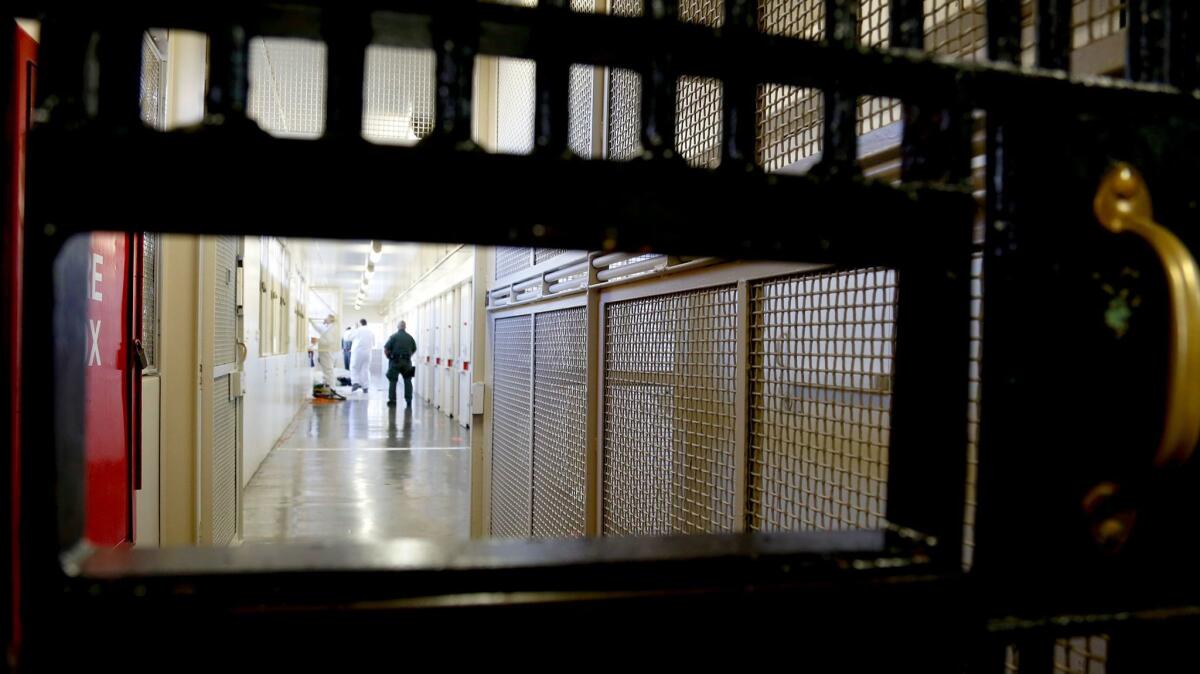Column: Political Road Map: California has long depended on an illegal-immigration program that Trump wants to kill

- Share via
Reporting from Sacramento — For all of the unprecedented elements of President Trump’s federal budget plans, there’s an item buried in the list of detailed spending cuts that has a familiar, contentious political legacy in California.
Trump has proposed canceling federal government subsidies to states that house prisoners and inmates who are in the U.S. illegally. He’s not the first president to try it, and undoubtedly will get an earful from states like California.
For sheer bravado, the award for defending that subsidy probably goes to former Gov. Pete Wilson. In a letter sent to federal officials in 1995, two days after Christmas, Wilson threatened to drop off one of the state’s undocumented prisoners — in shackles, no less — on the doorstep of a federal jail. (He never actually did it.)
“The intent of federal law is unequivocal,” Wilson wrote about the subsidy program. “The federal government must either reimburse the state at a fair rate for the incarceration of any undocumented inmate which it identifies or… take the burden of incarceration off the state’s hands.”
Wilson had won a second term the year before, with a blistering campaign attacking illegal immigration. His time in office was also marked by persistent state budget problems, and the money mattered. The state never got as much as it wanted, though, and years of squabbles followed over the fate of the State Criminal Alien Assistance Program, established as part of the sweeping immigration reforms of 1986.
Former Gov. Arnold Schwarzenegger did his fair share of complaining about skimpy SCAAP funding. In 2005, he and a bipartisan group of western U.S. governors demanded a boost in the program to a total of $850 million. That didn’t happen.
The past two presidents, George W. Bush and Barack Obama, offered their own proposals to cancel the program. Trump’s budget scores the possible savings at $210 million. His budget blueprint lampoons SCAAP as “poorly targeted,” and describes it as a program “in which two-thirds of the funding primarily reimburses four states” for housing felons who lack legal immigration status.
Want to take a guess which state gets the most? OK, that’s an easy one.
California’s state government received $44.1 million in the 2015 federal budget year, according to Justice Department data. Add to that another $12.8 million that was paid directly to California counties, with the largest local subsidy being the $3 million paid to the Los Angeles County Sheriff’s Department.
More than one-third of the entire program went to California. No other state’s share was even close. A win on this issue for the president would be particularly bitter for the state, where political animosity toward Trump is widespread.
Political Road Map: There’s a $368 billion reason that California depends on Washington »
In Gov. Jerry Brown’s budget unveiled last month, he assumed $50.6 million in federal help for prison costs related to felons in the U.S. illegally. A budget spokesman for Brown said the governor will ask for help from the state’s congressional delegation in saving the program. Still, it’s safe to say the estimate is now in doubt.
Roll back the clock, though, and take a look at how this political debate has changed. Wilson’s legacy on illegal immigration cast a long shadow as candidate Trump promised to go after “bad hombres” who are illegally in the country. The president’s official plan, by most estimates, would go even further.
When President Obama tried to nix the subsidy, conservatives warned it would endanger public safety. So far, few are making the same case now that it’s coming from Trump — a curious development, given California’s most famous illegal immigration critic once insisted the program was essential.
Follow @johnmyers on Twitter, sign up for our daily Essential Politics newsletter and listen to the weekly California Politics Podcast
ALSO:
Los Angeles County sheriff opposes legislation to create a ‘sanctuary state’ in California
Gov. Jerry Brown projects a $1.6 billion deficit by the summer of 2018
Updates on California politics and state government
More to Read
Get the L.A. Times Politics newsletter
Deeply reported insights into legislation, politics and policy from Sacramento, Washington and beyond. In your inbox twice per week.
You may occasionally receive promotional content from the Los Angeles Times.










